|
| Page 1 - The Story of Brush Breakers |
| Page 2 - Cape Cod Forest Fires |
| Page 3 - Before Brush Breakers |
| Page 4 - The First Brush Breaker |
| Page 5 - First State Fire Trucks |
| Page 6 - Fire Towers and the Patrol Planes |
| Page 7 - |
| Page 8 - |
| Page 9 - |
| Page 10 - |
| Page 11 - |
| Page 12 - |
| Page 13 - |
| Page 14 - |
| Page 15 - |
| Page 16 - |
| Page 17 - |
| Page 18 - |
| Page 19 - |
| Page 20 - |
| Page 21 - |
| Page 22 - |
| Page 23 - |
| Page 24 - |
| Page 25 - |
| Page 26 - |
| Page 27 - |
| Page 28 - |
| Page 29 - |
| Page 30 - |
| Page 31 - |
| Page 32 - |
| Page 33 - |
| Page 34 - |

| The story of how the Cape Cod brush
breakers came about starts with an understanding of what Cape Cod
was like in the "old days." This feature tries to document and
explain how the fire departments on Cape Cod and in southeastern
Massachusetts adapted vehicles to battle forest fires that burned
thousands of acres of woods each year. As the story goes, prior to 1937 or so, grass, brush, and woods fires were battled by hand, with hose lines that could reach a fire from a road. The alternative was to use hand tools and pump cans, but this was only good for smaller fires. By 1937, vehicles had apparently become large enough and powerful enough to be enhanced with steel bars, sufficient size water tanks, and pumps to go off road and reach fires deeper in the woods than previously possible. By accessing fires quicker, while still small, they were able to reduce a great deal of danger and damage. The fire chief in Osterville, Bernard S. Ames also served as the forest fire warden (common in those days). He and some of the other men, including Carl Starck who owned the local garage, and others no doubt, got together and turned a 1937 Ford COE (Cab Over Engine) chassis into a vehicle that came to be known as a "Brush Breaker" by welding steel bars and chassis protection to a truck with a large (believed to be about 800 gallons) tank and a pump. The truck was not even finished according to stories, when it responded to its first fire, a large woods fire in Hyannis. The paint wasn't even dry, and surely no one had any experience driving it. The truck got caught in the fire and burned at the first fire it responded to. It was of course rebuilt and became an example from which other departments designed and built trucks for their own communities. There continued to be many, many wildland type fires over the years and a number of generations of brush breakers have come and gone over the years. Each generation brought new innovations and adapted to changing conditions. Teams of brush breakers working together on Cape Cod established what became a mutual aid system and helped reduce the damage done by large out of control fires. Brush breakers are designed to literally go off road, push over trees as needed, to enter a forest or wildland area to reach a fire and extinguish it while it is still small enough to put out. The alternative is to allow the fire to grow substantially larger as it burns and destroys until it eventually reaches homes or other populated areas. The innovation of this apparatus worked here on the Cape because of the terrain, type of forestation, and other factors somewhat unique to the area. Brush breakers are still in use today and while the larger fires have been less often, the potential for them continues to exist. New apparatus continues to be built in anticipation of future fires. These pages show the development and use of apparatus used in battling brush and forest fires around the Cape.
|

OSTERVILLE FIRE STATION
The Centerville-Osterville Fire District was established in 1926 and two fire
stations were built, one in each village.
The Osterville station, at 999 Main Street, did double duty as the Town of
Barnstable's Forest Fire headquarters station as well.
This photo taken around 1938 shows the Osterville station and the apparatus
housed at the time.
C&O Engine 1 was a 1926 Maxim 500 gpm pumper.
TOB Forest Fire Dept patrol truck was a 1938 Ford patrol truck.
and TOB Forest Fire Department 1937 Ford COE was the first brush breaker on Cape
Cod.

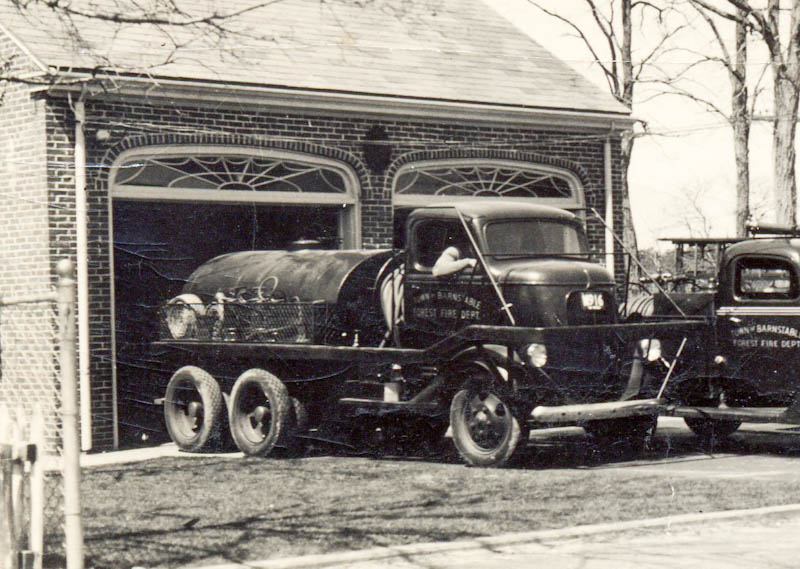
The
"First" of Cape Cod's Brush Breakers.
Built by the Town of Barnstable Forest Fire Department in 1937 on
a Ford Chassis.
It was built at Carl Starck's Garage on Main Street, Osterville.
Designed by T.O.B. Forest Warden and Centerville-Osterville Fire
District Chief Bernard .S. Ames
it had all wheel drive, an 800 gallon water tank, steel bars, and
a Leonard fire pump.
This unique apparatus was badly damaged by its first major fire,
in Hyannis on May 5, 1937,
even before it was officially in service. It was rebuilt and
served until 1952 at the
Osterville Fire Station.


Photo showing early trials or training with the new brush breaker in 1937.

A ROUGH START
The 1937 Ford
brush breaker was called to one of its first fires before it's
paint
had even dried.
This fire in the Ridgewood Avenue area of Hyannis
on May 5, 1937 burned
over 2000 acres into the Cummaquid area of town.
This newspaper
clipping
shows the raging fire as it destroyed the brand new brush
breaker.
The truck was rebuilt and served until 1952.

1937 Ford brush
breaker in Osterville.

1930 Forest Fire Truck from Edgartown, Martha's Vineyard

Plymouth forest fire truck c.1930s.
(Plymouth FD collection)
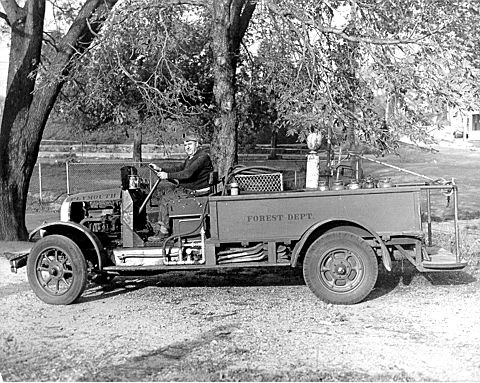
Plymouth forest fire truck c.1930s.
(Plymouth FD collection)
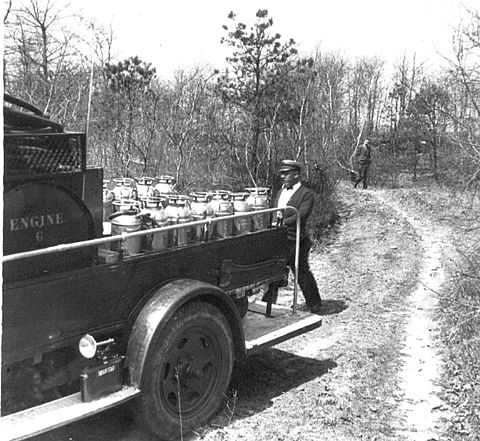
Plymouth Engine 6 with fire extinguishers c.1930s. .
(Plymouth FD collection)

This photo shows a Massachusetts Department of Conservation truck
c.1920s
drafting water from a bridge. This would have been one of the early forest fire
trucks
operated by the state to assist communities, some of which had little for fire
equipment at the time.

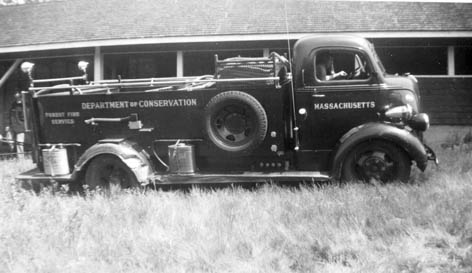
STATE FIRE TRUCKS
The Commonwealth of Massachusetts Forest Fire Services
operated a number
of these 1939 Ford 1-1/2 ton cab over fire trucks.
Each truck had a 400 gallon
water tank and a PTO pump, and carried about 2000' of hose.
The Sandwich
truck remained in service until 1966.
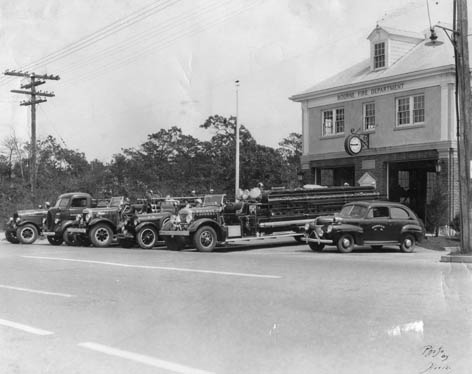
BOURNE FIRE STATION
Several of the State trucks were assigned to the Cape area.
One in Brewster
at the state forest, one in Sandwich, and one on the Vineyard. The
Sandwich
truck was later stationed at the Buzzards Bay Fire Station c.1941. (above).
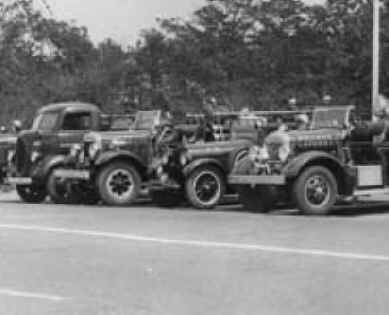
State fire truck can be seen on the left.
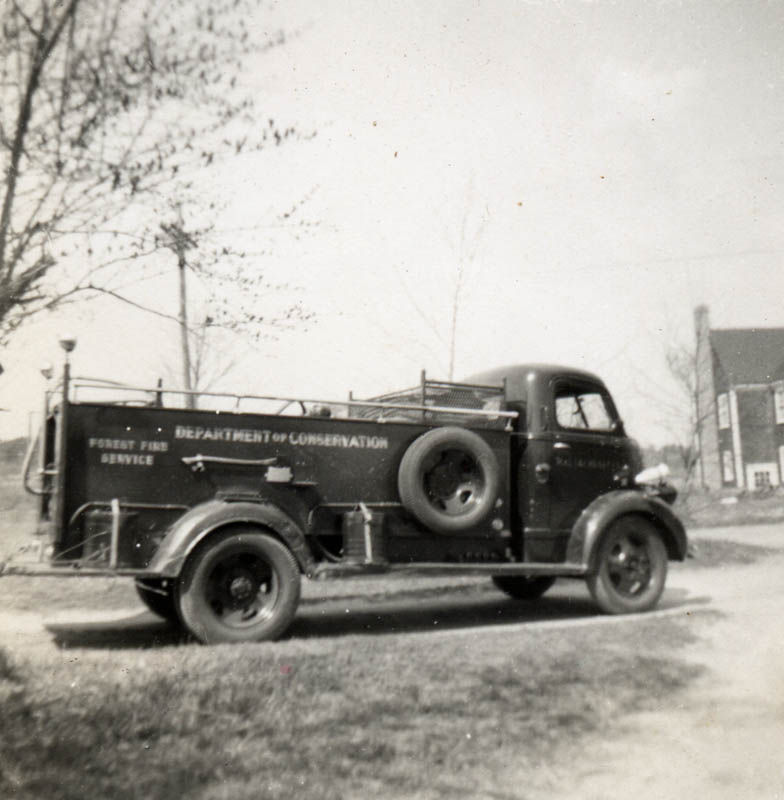
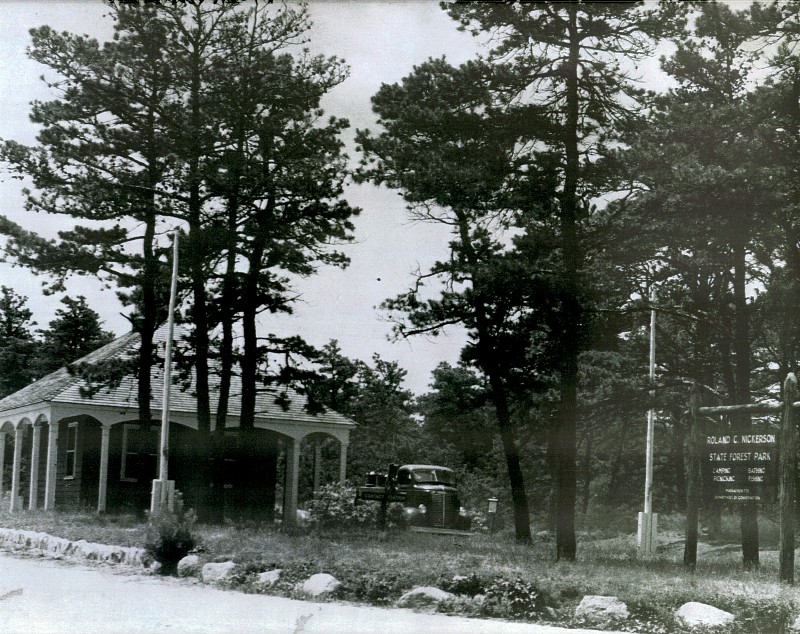
STATE FIRE TRUCK
One of the 1939 era Massachusetts Department of Conservation fire trucks
at the Roland C. Nickerson State Forest in Brewster.


1939 State Forest Fire Truck at Pocasset (Bourne) Fire Station.

One of the former State 1939 Ford 1-1/2 ton forest fire trucks.turned up in the
1990s
and it was hoped that the vehicle could be refurbished. It did not turn
out that way.
These photos taken at Shawme Crowell State Park.
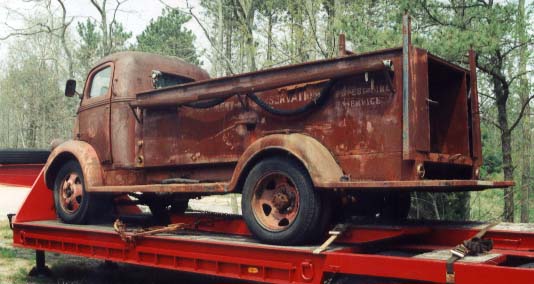
This 1939 Ford Forestry Truck was recently salvaged and
brought to
Shawme Crowell State Park to be refurbished.
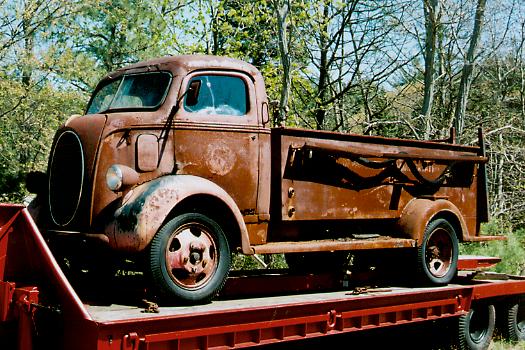
A number of these 1939 style Ford fire trucks apparently served
across the state.
| The
|
![]()
![]()
CAPE COD BRUSH BREAKERS
![]()
Related Links
Massachusetts DCR - Bureau of Forest
Fire Control
Forest Fire Lookout Association
History Early Fire Towers
Massachusetts Fire Tower Locations
CCFD.com - Plymouth Brush Breaker Drill April 2006
CCFD.com - Plymouth-Wareham Brush Fires May 2006
CCFD.com
- Sandwich Fire Tower 2006
Robert Winston Article on the
Fire Season in Eastern &
Southeastern, Mass
Posted May 23, 2008
NOTE
Photos in this series are from various sources
including fire department and personal collections.
(Top)